Sessions: Too much suppression of free speech on campus
Attorney General Jeff Sessions tells Tucker why the Justice Dept. is entering the legal fight over free speech on college campuses. Plus, Sessions sounds off on Trump vs. NFL #Tucker
It makes sense that it’s Republicans introducing laws because they’re the ones whose views are out of fashion in the academy now. A 2016 study showed there were 36 speakers disinviited, and pretty much all were conservative.
I went there that day to civilly protest Turning Point USA’s Professor Watch List...I brought a polite sign, stood silently and apart from everyone else. If someone encounters opposition, that does not mean their First Amendment rights have been violated.
I don’t want to feel that my ideas are unwelcome on my own campus. They just seem to go to great lengths to shut down the ideas of groups they don’t agree with.
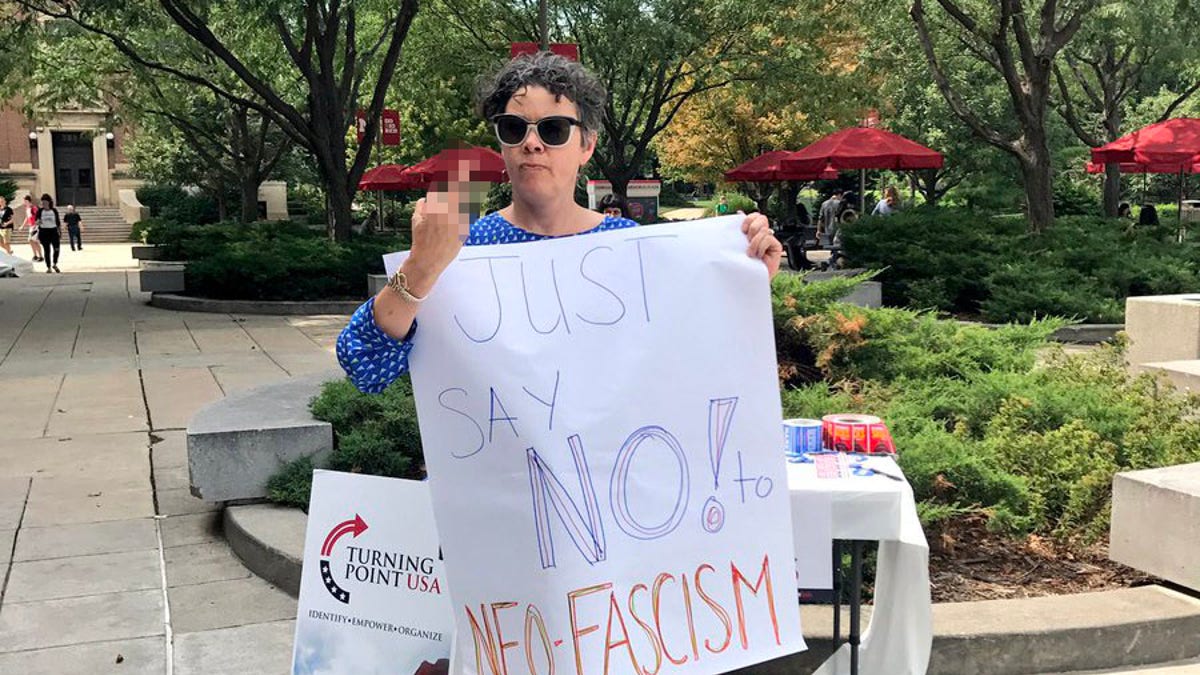
University of Nebraska graduate student Courtney Lawton objects to a conservative student's effort to recruit new members to Turning Point USA on campus. (Courtesy of Kaitlyn Mullen)
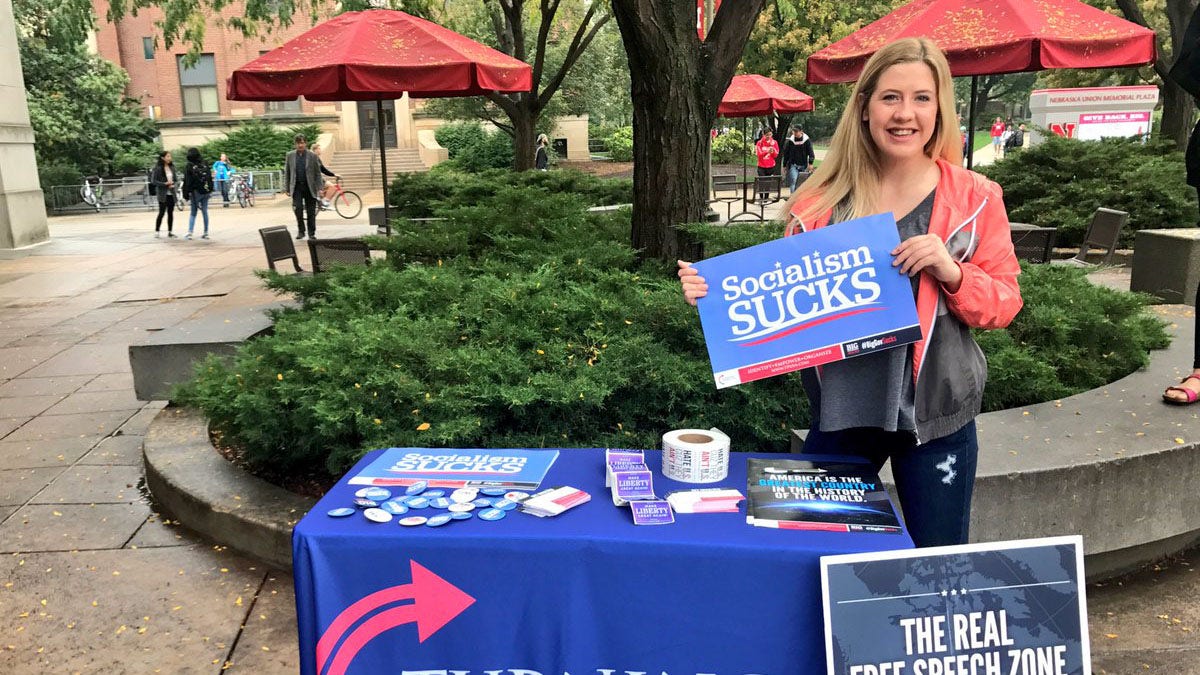
University of Nebraska student Kaitlyn Mullen in front of a table she set up on campus to recruit members to the conservative group Turning Point USA. (Courtesy of Kaitlyn Mullen)
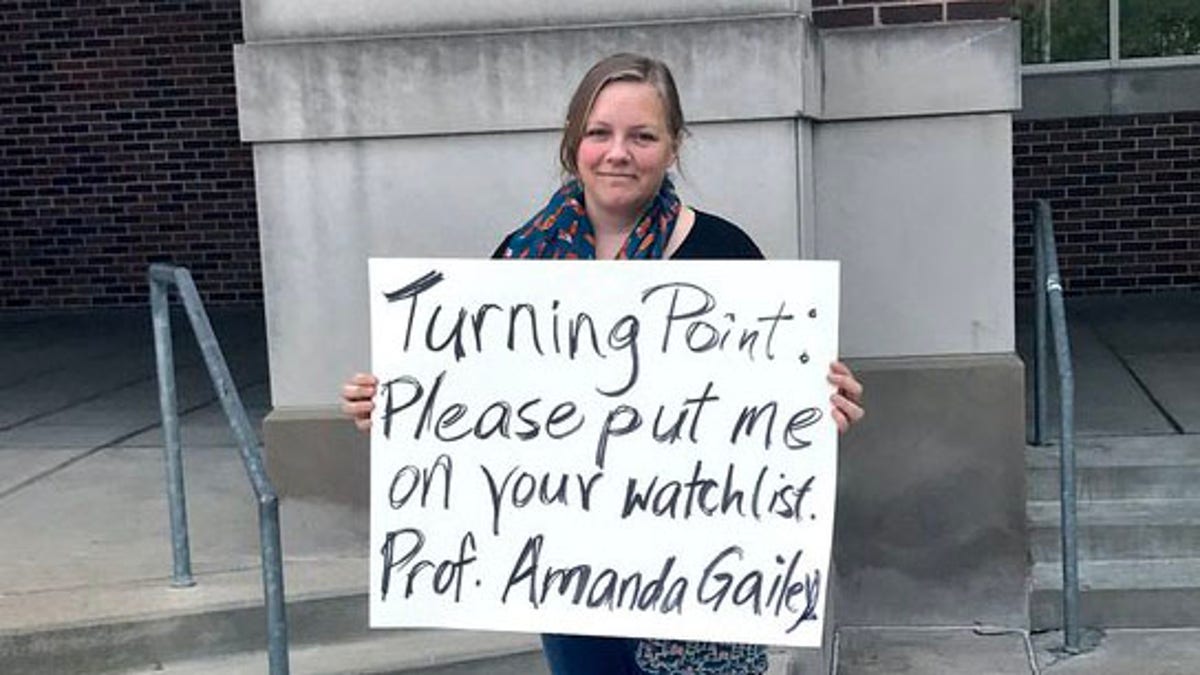
University of Nebraska professor Amanda Gailey directs a sign at a student recruiter for Turning Point USA, which compiles watch lists of teachers who it says hold radical liberal views. (Courtesy of Kaitlyn Mullen)
The pitched battle over campus free speech is expanding into state legislatures, with eight enacting laws on the issue, and more than a dozen others considering measures aimed at protecting First Amendment rights in colleges and universities.
Florida, Nebraska and Texas are in the midst of acting on introduced bills on campus free speech, and measures are pending in roughly 10 other states.
Republicans are the force behind the bills, which vary from one another on some aspects, but at their core seek to change policies and practices on college campuses that lawmakers and their supporters say disproportionately have been used to censor or curtail conservative speakers and student groups.
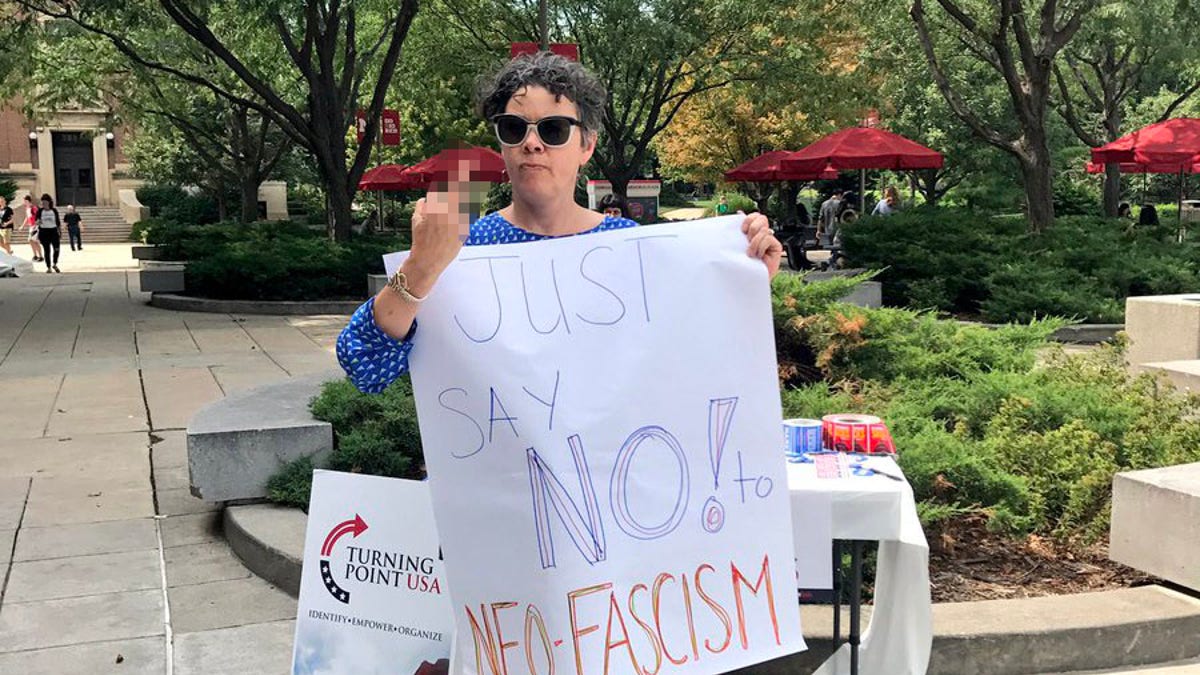
University of Nebraska graduate student Courtney Lawton protesting in front of a recruitment table for the conservative student group Turning Point USA. (Courtesy of Kaitlyn Mullen)
“Free speech is under pressure. We’re seeing a national push-back against censorship and the shout-downs on campuses,” said Thomas Lindsay, director of the Center for Higher Education at the Texas Public Policy Foundation, a conservative-leaning think tank. “It makes sense that it’s Republicans introducing laws, because they’re the ones whose views are out of fashion.”
Lindsay said a 2016 study showed there were 36 speakers disinvited from campuses across the country, and said “pretty much all were conservative.”
He drew parallels to the free speech campus movement of the 1960s, “when it was the left fighting for freedom of speech at colleges.”
Lindsay, who testified on the issue recently at a Texas legislative hearing, said violent incidents last year at Berkeley and the University of Missouri “brought this issue to the forefront, and it’s gaining steam."
States that have already enacted campus free speech laws are Virginia, Missouri, Arizona, Colorado, North Carolina, Tennessee, Utah and Wisconsin, according to the National Council of State Legislatures.
The debates among state lawmakers, unsurprisingly, are playing themselves out largely along party lines.
It makes sense that it’s Republicans introducing laws because they’re the ones whose views are out of fashion. A 2016 study showed there were 36 speakers disinvited, and pretty much all were conservative.
Republicans generally are fighting for states to, as they see it, protect First Amendment rights on campuses by pushing for measures that ban the common practice of restricting free speech activities -- such as protests or even handing out fliers that take a social or political stand on an issue – to designated areas. Many would like to see colleges drop often-cumbersome criteria for approving a lecture by a high-profile speaker or student political event – which many say are unevenly applied to conservatives.
Many Democrats say the Constitution already protects free speech, and that states have no need to micromanage how colleges handle student demonstrations and speakers. Many also object to the penalties some measures are calling for, such as fining or firing – in the case of professors and other college employees – those who are deemed to have deprived the free speech rights of a person or group.
A Florida bill approved by the Senate Education Committee, for instance, bans free speech zones on campuses and allows for suing the institution up to $100,000 in damages if the First Amendment rights of a speaker or protester are “willfully” violated.
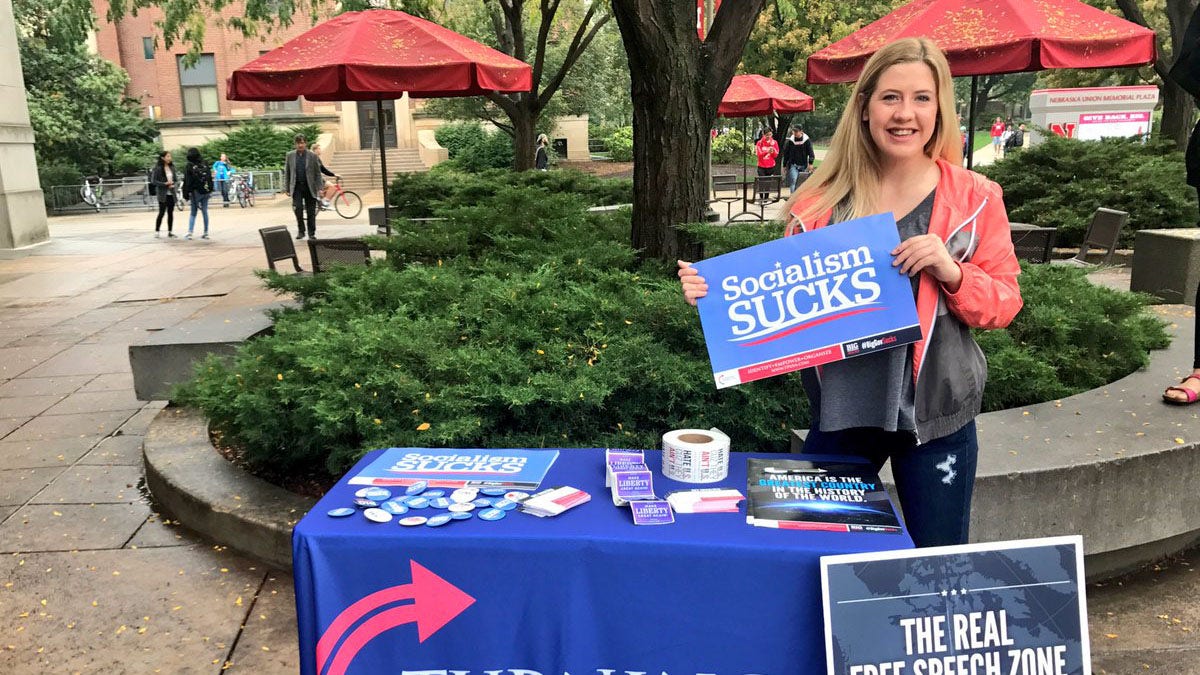
University of Nebraska student Kaitlyn Mullen standing at a table she set up to recruit members for the conservative group Turning Point USA. (Courtesy of Kaitlyn Mullen)
“This is to address a flourishing of the limitation of free speech, particularly across the country,” said bill sponsor Sen. Dennis Baxley, a Republican, according to the Gainesville Sun. “Many of our universities are restricting free speech to free-speech zones. And there’s something antithetical about a free-speech environment saying you can only do it in this little square.”
Democrat Sen. Perry Thurston unsuccessfully fought for the elimination of the liability provision, saying it presented a huge financial burden to colleges and universities that likely would be targeted in lawsuits.
“This bill will chill freedom of expression on our state’s college campuses,” said Kara Gross, policy counsel for the American Civil Liberties Union of Florida, to the Orlando Sentinel. “Because it would be up to our state’s institutions of higher learning to expend significant resources in defending against such frivolous lawsuits, this bill incentivizes those institutions to restrict students’ speech and peaceful assembly out of concern that someone might boo too loudly.”
Nebraska lawmakers are debating a campus free speech measure introduced by Republican State Sen. Steve Halloran following an incident that made national headlines last year. A student at the University of Nebraska in Lincoln who set up a table near the Student Union to recruit new members for her conservative group, Turning Point USA, was confronted by a graduate teaching assistant and two faculty members – an incident that reduced Kaitlyn Mullen, 20, to tears, and prompted her to go home.
I brought a polite sign, stood silently and apart from everyone else…I oppose that organization (Turning Point USA) but I do not oppose her right to advocate for it and I would not harass a student. If someone encounters opposition, that does not mean their First Amendment rights have been violated.
The graduate teaching assistant, Courtney Lawton, flipped off Mullen and called her a “neo-fascist,” videos of the incident show. The footage also shows Lawton saying, among other things, that the student “wants to destroy public schools, public universities.”
A professor, Amanda Gailey, stood farther away than the others, off to the side of Mullen with a sign that read: “Turning Point: Please put me on your watch list. Prof. Amanda Gailey.” Turning Point USA advocates for conservative causes and maintains a “professor watch list” of faculty it views as radically liberal.
Gailey said her intention was to express her opposition to Turning Point USA, which liberal groups say conducts witchhunts of professors who hold views they find objectionable. Critics of the group say Turning Point’s actions are not harmless because they encourage, even if inadvertently, threats and harassment of liberal professors.
“I went there that day to civilly protest Turning Point USA’s Professor Watch List,” Gailey told Fox News. “I brought a polite sign, stood silently and apart from everyone else … I oppose that organization but I do not oppose her right to advocate for it, and I would not harass a student. If someone encounters opposition, that does not mean their First Amendment rights have been violated.”
Gailey said that when she saw Mullen become upset, she “put down the sign to check on the student.”
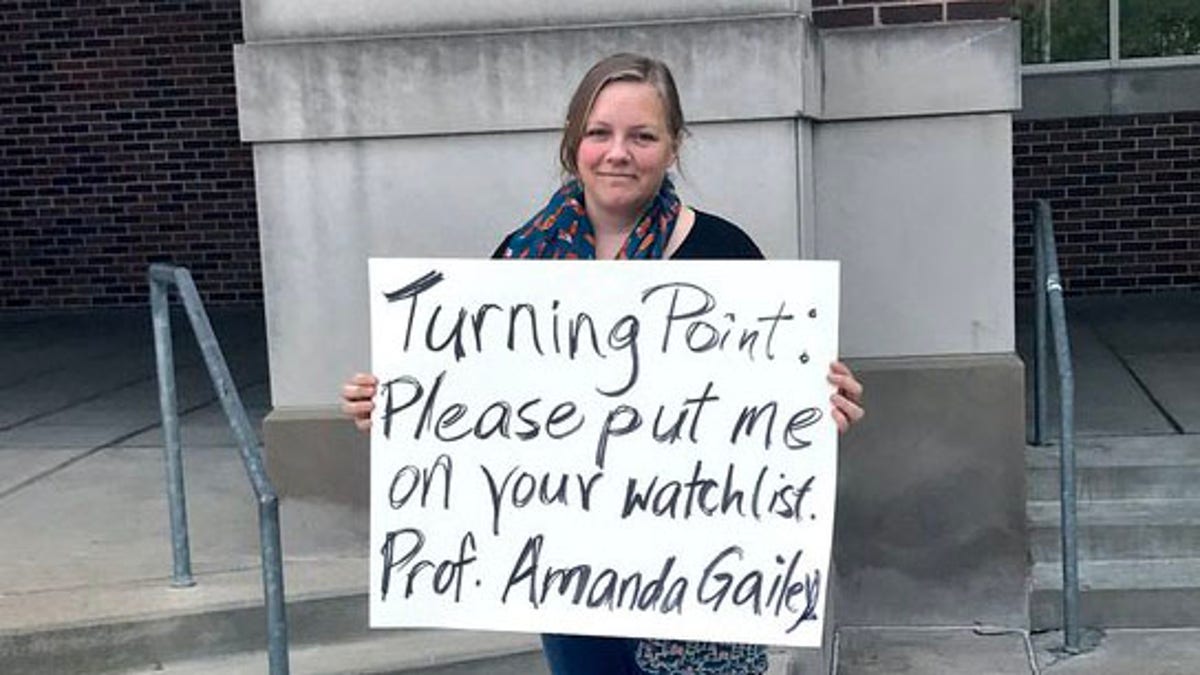
University of Nebraska professor Amanda Gailey. (Courtesy of Kaitlyn Mullen)
Mullen said she did not anticipate the tensions that erupted over her idea to set up a table – which she manned by herself -- in an area on campus that had heavy traffic, and to raise awareness about Turning Point USA. Mullen sees the incident as a vivid illustration of anti-conservative aggression happening around college campuses.
“I don’t want to feel that my ideas are unwelcome on my own campus,” she said. “I’ve gotten a lot of support, but also I’ve heard from a lot of people who don’t think I should be on campus, or that my club should be allowed on campus. We have a socialist group on campus, I’ve seen them set their table up to recruit members. They just seem to go to great lengths to shut down the ideas of groups they don’t agree with.”
Gailey notes that she does not agree with designated free speech zones, saying that in general "most public places on campus should be open to free speech."
The university later decided not to renew Lawton’s teaching contract, and has made changes to ensure free speech. “They’ve made the right decision,” Mullen said. “It’s disappointing that it took so long.”
Lawton did not respond to messages from Fox News seeking a comment.
Lindsay said the free speech debates, as contentious as they are, occurring among college administrators and state lawmakers, speak well for the country.
"Everyone sees there is a problem, and everyone agrees on affirming the primacy of free speech," he said. "That is very heartening."
"The country is very polarized in many ways," Lindsay said. "That means there's growing anger on both sides. And when we become angry, we refuse to listen, and that is when the First Amendment is most in jeopardy, and it is also when the First Amendment is most needed."










































